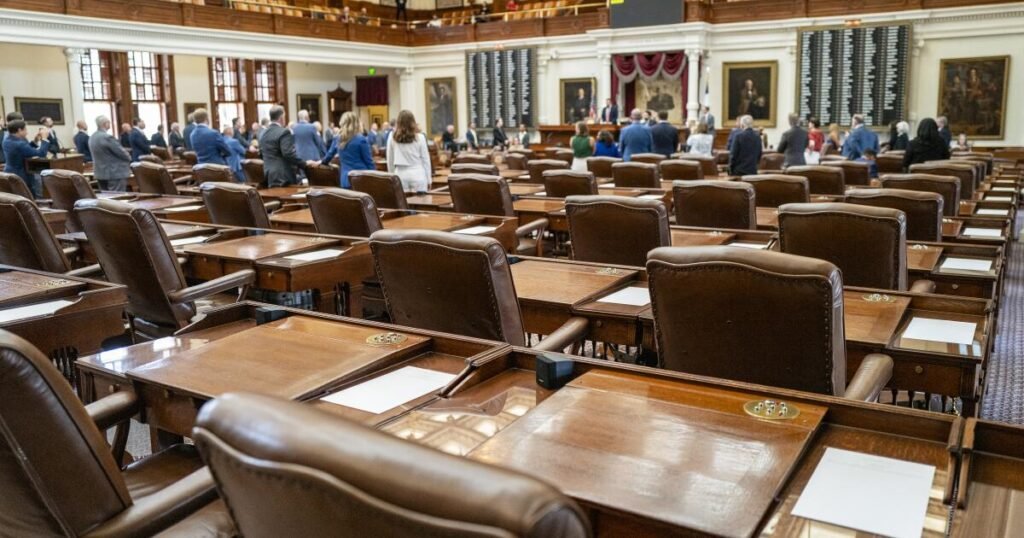California’s Political Battle Over Redistricting
In Sacramento, California took center stage in the ongoing national political struggle regarding congressional redistricting. Governor Gavin Newsom hosted Texas Democrats aiming to counteract President Trump’s initiatives to alter their local congressional districts.
California lawmakers, leaning towards the Democratic side, are gearing up to respond to the Republican-led redistricting in Texas. They are expected to unveil their own proposals next week, which aim to mitigate the Republican advantages observed in Texas for the 2026 elections. Newsom emphasized at a recent press conference the urgency of these measures.
“Without a doubt, California is moving ahead,” he stated. “We’re taking emergency actions to tackle what’s unfolding in Texas. We will counter what they are doing.” He also mentioned that while Democrats are in favor of maintaining an independent commission for redistricting, Trump’s plans in Texas necessitate a robust response to protect their interests in the upcoming midterms.
In response to the rally, a spokesperson for the Trump administration criticized Newsom, claiming he is merely attempting to advance his own political aspirations. “Gavin Newsom is a profound loser, and no matter how much he tries, he will never reach the presidency,” spokesperson Stephen Chen remarked.
This was the second occasion within two weeks that Texas Democrats gathered near the California governor’s mansion, cautioning that the Republican strategies to redraw district maps could undermine the influence of black and brown voters.
Their goal in leaving Texas was to deny the state legislature a quorum needed for redistricting decisions during a special session, despite facing fines of $500 daily for each missed day and potential arrest by Texas Governor Greg Abbott and other Republicans. Several members had recently evacuated hotels in Chicago following a bomb threat.
“We’re facing real threats here—threats to our jobs, our economic future, and it feels like we’re trapped while our colleagues sit idly by,” a Texas Democrat expressed. “As Democrats, we’re standing firm to ensure every voter’s voice is heard in the upcoming election, ensuring it isn’t stolen.”
High-profile California Democrats, including former House Speaker Nancy Pelosi and Congress members Zoë Lofgren and Mike McGuire, unified in their efforts to rally voters against Trump’s redistricting attempts.
Pelosi affirmed the collective stance of the California congressional delegation in opposing Trump’s proposals. “The groundwork he lays harms free speech, education, and our judicial independence,” she stated. “What he’s attempting in Texas is extreme and goes against fair elections.”
Pelosi countered arguments that challenged the necessity of their actions, insisting, “What we’re doing is defending our democracy.”
The proposed California plan calls for constitutional amendments aimed at establishing legislative districts designed to make Republican positions more precarious. If passed on November 4th, this would allow voters to revisit the congressional boundaries set by an independent commission in 2021 and determine their future for elections in 2026, 2028, and 2030.
The measure would activate only if Texas or other Republican-dominated states continue to manipulate district maps to favor their party before the midterms. After the 2030 elections, California would revert to past redistricting practices following the next census.
Currently, California voters seem somewhat divided regarding whether they prefer Newsom’s approach over the independent redistricting process they previously established. Polls indicate that 33% favor redrawing the congressional map, while 25% oppose it, with a significant 42% remaining undecided.
Newsom remains optimistic that Californians will back his proposals, attributing their necessity to Trump’s attempts to distort midterm elections. “I believe once people understand what’s at stake, they will see it clearly,” he said.
He argued that California’s process is inherently more transparent than Texas’s, as voters will have a direct say in approving the map.
On the other hand, Governor Abbott continues his push to remap Texas districts without requiring voter input, in pursuit of additional congressional seats for the GOP. The outcome of the ongoing efforts in Austin remains uncertain, but Democrats are determined to resist, despite Abbott’s insistence on continuing the fight.
The current special session in Texas is set to conclude on August 19th. Abbott has announced intentions to keep calling sessions with similar agendas.
Democrats face risks of civil warrants and potential removal from their posts, along with financial penalties affecting their paychecks, requiring them to collect checks directly from the capitol.
This reshaping of district lines is more than just a local struggle; it could also bolster Newsom’s profile as he positions himself as a significant player in the national political theater leading up to potential presidential aspirations in 2028. Since Trump’s tenure began, Newsom has worked to balance criticism against the president while seeking collaboration for disaster recovery. However, tensions escalated after Trump deployed the National Guard for immigration enforcement, prompting a firm response from Newsom.







